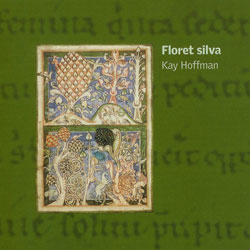 Floret Silva is a pure 70s art rock project, from concept to execution, a progressive folk adaptation of the 13th-century medieval songs collectively known as the Carmina Burana. Remarkably, it does not collapse under the weight of its own concept, and holds up quite well nearly 30 years after its recording.
Floret Silva is a pure 70s art rock project, from concept to execution, a progressive folk adaptation of the 13th-century medieval songs collectively known as the Carmina Burana. Remarkably, it does not collapse under the weight of its own concept, and holds up quite well nearly 30 years after its recording.
When people remember 1970s art rock as turgid and boring—groups of shaggy, acid-addled Tolkien enthusiasts wanking on synthesizers, carrying on with the pretensions of classical or avant-garde musicians—they aren't usually talking about albums like this one.
Robot Records isn't usually in the business of reissuing lost 70s prog classics, so this seems to be a strange entry in their discography. Perhaps this reissue was motivated by the fact that Kay Hoffman recruited members of revered Italian experimental progressive group Pierrot Lunaire (also named after a song cycle), including the stunning vocals of Jacqueline Darby. Records like 1977's Gudrun have become holy grails for collectos of obscure European prog rock, incorporating an almost absurd variety of disparate musical approaches into a Faust-like patchwork that recalls the later work of HNAS and Nurse With Wound. Perhaps not surprisingly, Pierrot Lunaire earned their requisite spot on the famous NWW influence list, and Christoph Heeman of HNAS assists with the digital transfer of this reissue.
This is not to suggest, however, that Floret Silva shares the cracked eclecticism typical of Pierrot Lunaire's work. In fact, nothing could be further from the truth. If there are any music touchstones for this album, it would be nearer to the mark to invoke the names of John Renbourn, Jan Dukes de Grey and especially Current 93. I was immediately reminded of Michael Cashmore's compositional style when listening to "Quot Sunt Horae," and I got the same C93 spine tingle from the brief, spooky voice piece "Exorcismus." For this album, composer and arranger Hoffman has wrangled a group of gifted musicians noted for their experimental adventures, forcing them to hone in on a particular aesthetic, a conceptual cycle of songs that feel as if they are each movements of a single piece. The instruments played on the album closely match the 70s psych-folk canon - bouzouki, recorder, clavinet, flute, organ, acoustic guitar - and the conscious references to medieval musical modes is far from unique for this time period. What ultimately sets this album apart from its stylistic cousins is the composition itself, a unique and magical set of well-orchestrated musical settings that fit the text perfectly.
The Carmina Burana is a time-tested source of musical inspiration. Carl Orff's 1937 choral version is probably one of the most famous and overplayed classical pieces of all time. Other versions by Ray Manzarek and Philip Glass, or German band Corvus Corax, have not been as successful, for very good reasons. Hoffman's version evokes the text so beautifully that I soon ceased comparing her version to Orff's. Hoffman's unorthodox combinations of ritual drumming, stately medieval chanson melodies, mood-enhancing drone, and the amazing multitracked vocals of Jacqueline Darby, are mesmerizing. This is without even mentioning the brief sound effects suites that unexpectedly intrude into the piece, subtly and hypnotically dislocating the music, placing it amidst a world of hallucinatory enchantment. In a way, this newer, druggier version gets across the extremely sensual, paganistic intentions of Carmina far better than previous versions, giving newly pscyhedelic dimensions to lines such as: "How I am longing and not knowing why/I look at myself/not recognizing myself anymore."
The music is a bright amalgam of jazz rock tropes and medieval flourishes, and rarely suffers from overloaded arrangements, Hoffman's background in minimalist composition serving her well. Genius touches, such as the bassoon solo recorded outdoors at night on "Intermezzo (Fagott Sommer Nacht Promenade)," or the gently echoing water effects that add a tangibly magical texture to "Tempus Instat," elevate the album from interesting relic of a bygone era to something that is more relevant now than in its own time. For all of the aspirations of neo-medievalists such as Sol Invictus or Fursaxa, I've rarely heard something as poised and accomplished as the music on Floret Silva. This album is like the prettier, more elegant companion piece to Nico's somber medieval explorations on The Marble Index; less emphasis on mood and drone, more on composition and virtuousity, but no less fascinating a result. The notion of a series of progressive folk songs sung in Latin doubtless raises a red flag for most discriminating listeners but Floret Silva completely avoids the usual pitfalls plaguing such ambition and audacity. It is a timeless album that has luckily been rescued from the clutches of obscurity.
samples:
Read More

